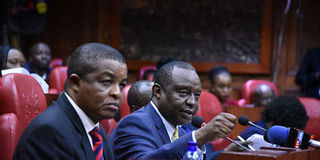Did Treasury break the law by opening sugar floodgates?

Kenya Revenue Authority Commissioner General John Njiraini (left) and National Treasury Cabinet Secretary Henry Rotich when they appeared before MPs at County Hall, on matters sugar on June 25, 2018. PHOTO | DIANA NGILA | NATION MEDIA GROUP
What you need to know:
- It's also definitely a violation of the law which provides that emergency duty imports must be done by government agents.
- Although the notice remained silent on the sugar, it was specific that only 9,000 tonnes of powder milk were required in the country at the time.
Agriculture Cabinet Secretary Mwangi Kiunjuri on Monday accused Treasury of opening the floodgates allowing the dumping of 1.3 billion kilos of sugar into the market, effectively knocking millers out of business for a long time.
Mr Kiunjuri said Treasury, in an unprecedented move, allowed everyone, without a licence, to import as much sugar as they wished, of whatever quality and type.
This was in violation of the laid down procedure and previous practice which involves the Agriculture ministry advising Treasury which sugar is to be imported and in what quantities. The importers are also licensed.
It's also definitely a violation of the law which provides that emergency duty imports must be done by government agents.
Mr Kiunjuri was testifying before a joint sitting of Agriculture and Trade, Industry and Cooperatives committees of the National Assembly investigating the entry into the Kenyan market of sugar feared to be contaminated with heavy metals like copper and lead.
EXECUTIVE ORDER
Through gazette notice No. 4536 of May 12, 2017, Treasury Cabinet Secretary Henry Rotich, apparently responding to a presidential executive order, lifted duty on sugar, maize and powder milk.
In the executive order, President Uhuru Kenyatta declared the prolonged drought in some parts of the country a national disaster.
The notice was to last until August 31, 2018, in line with the East African Community Customs Management Act of 2004. But by the time it was closed, about 1.3 million metric tonnes of the duty free sugar had been imported largely from the non-Comesa region.
Although it is not quote clear whether the lake region where sugar is grown was hard hit by the drought, the government gave permission for the importation of sugar all the same.
Kieni MP Kanini Kega chairs the Trade committee while Mandera South MP Adan Haji leads that of Agriculture.
OPENED FLOODGATES
Mr Kiunjuri told the joint sitting of the two committees that the gazette notice opened the floodgates for all, including those who are not licensed to import the commodity.
According to Kiunjuri, the Ministry of Agriculture, through the Agriculture, Food, and Fisheries Authority (AFFA) only advises the Treasury on the quality and quantity to be imported as well as issue licenses to the traders.
Whereas Treasury was to specify in the gazette notice the quality and tonnage as advised by the Agriculture ministry and required by the AFFA Act, this did not happen, a loophole that Mr Kiunjuri said was exploited by the importers at the expense of the government.
“Because everyone was allowed to import the duty-free sugar, they did so against the advice of the ministry. We did not issue licenses to the entities that were involved. The window was open to everyone and there was no limit in terms of the amount one was required to import,” Mr Kiunjuri said adding; “but we must take caution to ensure that this doesn’t happen again.”
QUALITY STANDARDS
“We advised the Treasury accordingly on the type and quantities of sugar to import and licensing. Once we do that, our mandates ends there as the other government agencies like Kenya Bureau of Standards take over in terms of quality standards,” he said.
Although the notice remained silent on the sugar, it was specific that only 9,000 tonnes of powder milk were required in the country at the time.
However, Mr Rotich, who appeared before the committee in the afternoon, defended the open window saying that at the time the importation was conceived, the country was facing a serious famine following a prolonged drought.
Nevertheless, he said that the AFFA under the ministry of Agriculture should have enforced the regulations to ensure that what was imported was of the right quality.
“The procedure for importing ought to have been followed because there are regulations in place that falls under AFFA under the Agriculture ministry,” Mr Rotich said.
LOST BILLIONS OF SHILLINGS
He also told the committee that there was no time to identify “who the importer should be.”
The country may have lost billions of shillings in tax evasion by individuals who took advantage to import sugar meant for purposes other than domestic use without paying duty.
The duty waiver was only meant for the powder milk and sugar but manufacturers of soft drinks, beer, confectionery, among others, may have taken advantage to make super profits at the expense of the taxman.
Interestingly, some of the companies that imported the contraband sugar include those which had been blacklisted by the Agriculture committee in the last Parliament.
According to the East African Community Customs Management Act of 2004, goods imported for emergency or relief must be within a short period of time and must be imported by government agents. Mr Rotich did not explain to MPs whether those given the window to import were government agents.




